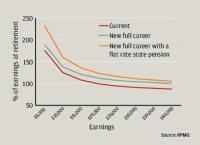Longest serving public sector staff to receive massive pension hikes
Low-paid NHS and education workers could receive pensions of nearly 250% of their final salaries, if public sector and state pension reforms go ahead.
Analysis of the scheme from accountants KPMG show current NHS staff on £20,000 or less can retire on more than 100% of their annual wage, providing they work a full career – around 40 years – up to the scheme’s retirement age of 60.
And government proposals to move the scheme from 1/60ths to 1/54ths accrual and raise the retirement age to 68 mean staff will reach this point at £30,000 a year, while those earning below £10,000 annually will get pensions of 200% of their wages on retirement.
The research, conducted for chief Treasury secretary Danny Alexander, and seen by PW, shows this number rises to 230% if the government’s preferred flat-rate £140-a-week state pension comes to pass.
KPMG head of public sector pensions Steve Simkins, who worked on Lord Hutton’s report into public sector pension reform, said the teachers’ pension scheme yields similar results.
He claimed the government should consider docking the value of the state pension from the retirement incomes of staff working to retirement.
“While it is vital lower earners have adequate retirement provision, the proposed scheme design will provide much more than is necessary,” he said.
“This will be exacerbated by the introduction of a flat-rate state pension. This design flaw is likely to have to be considered long before the government’s timeframe for these reforms. A good solution would be to integrate public sector pension scheme benefits with the state pension.”
The reforms are still the subject of negotiation between the government and trade unions, who went on strike over the proposals in November.
Unite the Union this month refused to accept the proposals. General secretary Len McCluskey called them “pernicious attempts to make hard-working and dedicated NHS staff pay more, work longer and get less when they retire” and “part of an overall design to privatise the NHS, cut public services, break-up the national pay agreements, and disrupt legitimate trade union activities and organisation”.
Most Viewed
- LGPS latest: GLIL backers invest £475m for UK infrastructure push
- What does Labour have in store for the pensions industry?
- Dashboard costs rose by 23% in 2023, figures show
- Border to Coast launches UK strategy in major private markets push
- How the pensions industry can better support people with mental health problems


